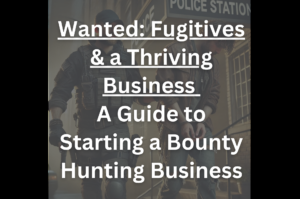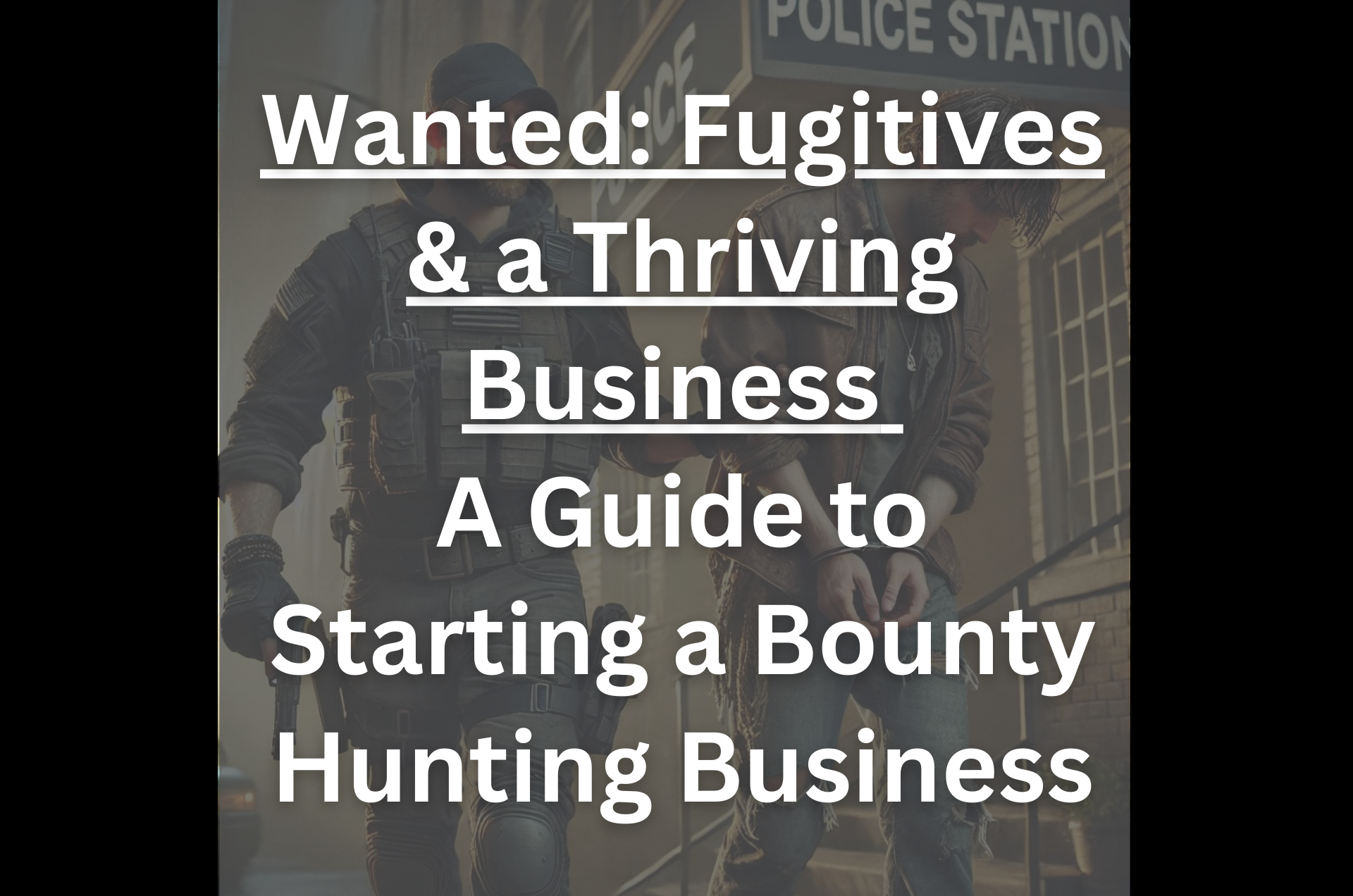**Disclosure:** We believe in honesty and transparency to the fullest extent. Some of the links on this blog are affiliate links, meaning, at no additional cost to you, we will earn a commission if you click through and make a purchase. This is one of the simplest ways you can support us.

Bounty hunting is a unique and challenging profession, offering a blend of excitement, danger, and the satisfaction of bringing fugitives to justice. But before diving into this line of work, it’s crucial to understand that bounty hunting is not for the faint of heart. It requires a combination of grit, tenacity, investigative skills, and the ability to navigate a demanding and often unpredictable environment.
Bounty hunters, also known as bail enforcement agents, make money by capturing fugitives who have skipped bail. When a person is arrested and released on bail, they are required to attend all court appearances. If they fail to do so, the bail bond company that posted their bail risks losing the full bail amount. To avoid this loss, the bond company hires a bounty hunter to track down and apprehend the fugitive, bringing them back to face justice. The bounty hunter is typically paid a percentage of the total bail amount, which can range from 10% to 20%, depending on the agreement. This incentivizes bounty hunters to locate and capture fugitives quickly and efficiently, often making their work both challenging and lucrative.
Is Bounty Hunting Right for You?
Bounty hunting isn’t a typical career choice, and it’s essential to assess whether you have the right background and mindset for this profession. The following individuals are often well-suited for a bounty hunting career:
- Former Law Enforcement Officers: With their training, experience in criminal justice, and familiarity with the legal system, former police officers and deputies can transition smoothly into bounty hunting.
- Private Investigators: Those with a background in surveillance, tracking, and investigative techniques can leverage their skills to locate and apprehend fugitives.
- Individuals with Strong Observational Skills: If you have a keen eye for detail, strong problem-solving abilities, and a sense of justice, bounty hunting may be a fulfilling career for you.
How Bounty Hunting Works
Understanding the mechanics of bounty hunting is crucial before you begin:
- Bail Bonds and Contracts: Bounty hunters usually work for bail bond agencies. When a defendant skips bail, the agency hires a bounty hunter to locate and return the fugitive to custody. The terms of service and payment are outlined in a contract, which is often based on a percentage of the bail bond amount.
- Gathering Information: The first step in any bounty hunt is thorough research. This involves collecting data on the fugitive, such as their last known address, associates, potential hideouts, and other critical details. This information is vital for planning the capture.
- Tracking and Capture: Bounty hunters use a variety of methods to locate fugitives, including surveillance, skip tracing, interviews, and even monitoring social media activity. In many cases, bounty hunters collaborate with local law enforcement to apprehend the fugitive safely and legally.
- Returning the Fugitive to Custody: Once captured, the fugitive is handed over to the appropriate authorities, ensuring they are returned to the legal system and the bail bond is secured.

Making a Living as a Bounty Hunter
Bounty hunting can be financially rewarding, but it’s important to understand the fee structure:
- Fee-Based Earnings: Bounty hunters typically earn a percentage of the bail bond, usually ranging from 10% to 25%. The exact amount depends on factors such as the difficulty of the capture, the fugitive’s risk level, and the specific terms of the contract.
Marketing Your Bounty Hunting Business
To build a successful bounty hunting business, effective marketing and networking are essential:
- Network with Bail Bondsmen: Establishing strong relationships with bail bond agencies is critical. These agencies are your primary clients, and a good reputation can lead to a steady stream of work.
- Join Professional Associations: Organizations like the National Association of Fugitive Recovery Agents provide networking opportunities, resources, and ongoing professional development. Membership in such associations can enhance your credibility and visibility in the industry.
- Establish an Online Presence: Create a professional website that highlights your services, experience, and commitment to ethical practices. Online directories and social media can also help potential clients find you.
- Build a Reputation for Ethical Practices: In a field where trust and legality are paramount, a reputation for integrity, reliability, and strict adherence to legal guidelines is crucial. Ethical practices will not only protect you legally but also enhance your long-term success.
Key Considerations Before Starting
Before starting your bounty hunting business, keep these important considerations in mind:
- Know the Laws: Bounty hunting is heavily regulated, with laws varying significantly by state. Thoroughly research the legal requirements in your jurisdiction and ensure full compliance.
- Acquire Training: Seek out specialized training programs that focus on bail enforcement, fugitive apprehension, and legal compliance. Proper training is essential for both effectiveness and safety.
- Secure Licensing: Most states require bounty hunters to be licensed. Obtain the necessary licenses and certifications to operate legally.
- Understand the Risks: Bounty hunting is inherently risky, with potential dangers and legal complexities. Always prioritize safety, exercise caution, and adhere to ethical guidelines.
- Specialize: Consider specializing within the bounty hunting sector. Whether it’s high-risk fugitives, cross-state recoveries, or another niche, specialization can make your services more appealing and help you stand out in a competitive market.
Rules They Must Abide By:
No Federal Jurisdiction: Bounty hunters do not have federal authority and must operate within the legal boundaries of each state. They cannot cross state lines to apprehend a fugitive without permission.
Limited Use of Force: While bounty hunters can use force to apprehend a fugitive, the force must be reasonable and necessary. Excessive force can lead to criminal charges.
Entry into Private Property: Bounty hunters can enter a fugitive’s property without a warrant if they believe the fugitive is inside, but they must be careful. Entering the wrong property or causing unnecessary damage can lead to trespassing or other charges.
No Impersonating Law Enforcement: Bounty hunters are not law enforcement officers and cannot present themselves as such. Impersonating an officer is illegal and can result in severe penalties.
Notification of Local Authorities: In some jurisdictions, bounty hunters must notify local law enforcement before attempting to apprehend a fugitive. This is to avoid conflicts and ensure public safety.
No Collecting a Bounty on Yourself: A bizarre but necessary rule—bounty hunters cannot collect a bounty on themselves by turning themselves in for a crime.
Restrictions on Apprehending Non-U.S. Citizens: In some areas, bounty hunters may face legal challenges or restrictions when attempting to apprehend non-U.S. citizens, particularly if the individual is in the country illegally or has diplomatic immunity.
Conclusion: A Challenging but Rewarding Path
For the right person or group of people, bounty hunting can make a challenging yet potentially rewarding career that demands a unique blend of skills and mindset. By understanding the intricacies of the profession, adhering to legal and ethical practices, and effectively marketing your services, you can build a successful business that plays a crucial role in the justice system and makes a meaningful impact on your community.










